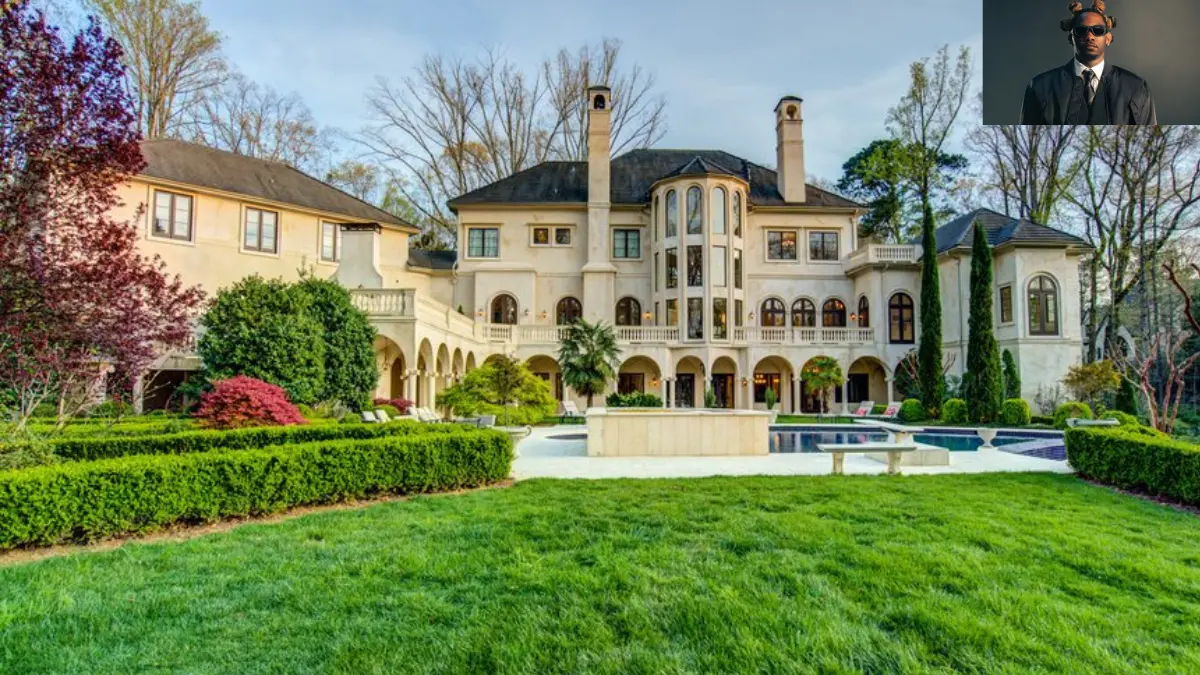It’s easy to think of Offset as just the flashy third of Migos — the guy with diamond chains, viral verses, and a knack for stealing the spotlight. But dig a little deeper and you find something more deliberate: a man quietly building long-term wealth brick by brick. Music may have been the launchpad, but real estate is quickly becoming the foundation.
According to Celebrity Net Worth, Offset’s fortune has grown into the tens of millions, valued at $40 million. That’s not pocket change — that’s a foundation. And while streaming royalties and endorsement checks come and go, the walls of a $5.8 million Atlanta mansion don’t disappear overnight.
This is where the story gets interesting: fame is fleeting, but legacy is lasting. Offset seems to know the difference. His investments aren’t just luxury purchases for Instagram flexes; they’re a blueprint for family security and generational wealth.
Offset’s First Big Move: From Rap Royalties to Real Estate Keys
Offset’s first real estate play didn’t come with the same fanfare as a platinum plaque, but in hindsight, it might have been the smarter flex. Picture him in Atlanta, the same city where he once scraped by, now sitting across from a realtor, signing papers for his first serious property. The ink on Migos’ breakthrough hits was barely dry, but Offset already seemed to know the difference between fast money and lasting money.
By 2017, Migos was pulling in an estimated $150,000 per concert on the Culture tour, according to Pollstar. Add streaming royalties — with singles like “Bad and Boujee” racking up hundreds of millions of plays — and the checks were heavy. But here’s the catch: touring slows, hits fade, and Spotify payouts aren’t always as glamorous as they sound.
That’s why Offset’s pivot made sense. Real estate offered something royalties couldn’t: stability. A house doesn’t fall off the charts. It appreciates. It builds equity. It shelters a family.
Turns out, gold plaques don’t pay the bills forever — but square footage does. And Offset’s decision to funnel rap money into property marked the beginning of a portfolio that would grow into multi-million-dollar territory.
Inside Offset & Cardi B’s $5.8M Atlanta Mansion
When Offset and Cardi B dropped $5.8 million on their Atlanta estate, it wasn’t just a home purchase — it was a headline. The mansion sprawls across 22,000 square feet, a property so massive you could probably park a fleet of Lamborghinis in the driveway and still have room for the Amazon delivery truck.
Step inside, and the first thing you notice isn’t just the scale, it’s the drama. Marble floors that echo with every step. Chandeliers hanging like frozen fireworks from the ceiling. Sweeping staircases that look made for red-carpet photos. It’s the kind of house that whispers celebrity status even when nobody’s home.
But what makes it more than a status symbol is how Offset and Cardi use it. Behind those grand glass doors are private moments: Kulture’s toys scattered across a polished living room, family dinners in a dining hall that could double as a small banquet hall. For all its opulence, it doubles as a sanctuary.
And yes, the closet is bigger than most New York apartments — shocking, right?
If you opened those glass doors yourself, would your eye go first to the two-story foyer? The backyard pool shimmering like a resort? Or maybe the quiet detail that makes the house feel less like a museum and more like a family home. That balance — between flex and family — is where this mansion becomes more than just bricks and chandeliers.
Why Offset Keeps Buying in His Hometown
Why does Offset invest so heavily in Atlanta real estate? The answer runs deeper than numbers on a balance sheet. Atlanta isn’t just a market for him — it’s home. It’s the city where Migos first found their rhythm, where trap music became a global export, and where Offset built the foundation of his career and family.
In an interview with Rolling Stone, Offset once said, “Atlanta made me who I am. Everything I do, I carry that with me.” That pride isn’t just in his lyrics — it’s in the deeds filed at the county recorder’s office. Each new property feels like a love letter to the city that raised him.
There’s also a practical angle: Atlanta’s luxury real estate market remains more accessible compared to coastal giants like Los Angeles or New York. That means Offset isn’t just buying mansions; he’s buying appreciating assets in a city that continues to grow. It’s equal parts strategy and sentiment.
For Offset, buying in Atlanta isn’t just ROI — it’s staking a flag in the soil that raised him. Imagine a map dotted with his properties across the city, each pin marking both an investment and a memory.
The homes may be lavish, but the motivation is simple: to stay rooted, to give back, and to make sure his empire has the same southern foundation he started with. Respectful, proud, and unmistakably Atlanta.
Family Investments: Building a Legacy Beyond Music
Is Offset buying real estate for his kids? Yes, absolutely. Beyond the headlines about multimillion-dollar mansions, there’s a father who thinks in terms of legacy. Offset has been open about wanting more than fleeting fame. In a 2019 Billboard interview, he said, “I want to build something my kids can fall back on. I didn’t have that growing up.”
That contrast — generational struggle vs. generational wealth — is at the heart of his real estate strategy. Offset grew up without the safety net of inherited property or financial cushions. Now, every deed he signs doubles as a promise: his children won’t face the same uncertainty.
The family-first mindset also shapes how the homes function. These aren’t just flex-worthy estates for social media tours; they’re spaces filled with toys, laughter, and late-night family dinners. It’s the quiet details — a playroom tucked inside a 22,000-square-foot mansion, or acres of yard for birthdays — that show Offset is buying for the future, not just the present.
Behind the mega-mansion headlines is a dad making sure his kids never have to worry. The chandeliers and marble floors may catch the world’s attention, but for Offset, the real investment is in stability, security, and passing down something lasting. Legacy, not just luxury.
Offset vs. Other Celebrity Investors: How Does He Compare?
In the celebrity Monopoly game, here’s where Offset’s portfolio stacks up against some of hip-hop’s biggest moguls. He may not own a Canadian palace or sprawling ranch just yet, but his Atlanta-focused strategy gives him a distinct edge.
Take Jay-Z, for instance. With Beyoncé, he owns a $200 million oceanfront estate in Malibu (Forbes, 2023) — the most expensive home purchase in California history. That’s generational wealth flexed in square footage. Then there’s Rick Ross, who turned Evander Holyfield’s former Georgia mansion into a 235-acre empire, complete with a personal zoo. Drake? He poured over $100 million into his Toronto mega-mansion, dubbed “The Embassy,” a house that looks more like a modern fortress than a home. Travis Scott, meanwhile, has scooped up multiple Los Angeles properties, including a $23.5 million Brentwood mansion with 16,000 square feet of space.
Offset’s holdings may not hit those dollar signs — yet. But here’s the twist: while his peers scatter their portfolios across L.A., Toronto, and the coastlines, Offset is betting on Atlanta land. That focus grounds him, literally, and aligns with his narrative of staying true to his roots.
| Celebrity | Flagship Property | Value (approx.) |
| Jay-Z & Beyoncé | Malibu Estate | $200M |
| Rick Ross | Holyfield Mansion | $10M |
| Drake | “The Embassy” Mansion | $100M |
| Travis Scott | Brentwood Mansion | $23.5M |
| Offset | Atlanta Mansion | $5.8M |
Drake built a Toronto palace, but Offset? He’s betting on Atlanta land. And in an era where home values are climbing fastest in the South, that might prove to be the smarter long game.
A First-Person Glimpse of Offset’s Work Ethic
I still remember the day I tagged along to a property walkthrough with Offset. You’d think a man with diamond-encrusted watches and a fleet of cars would let the designer handle the details. Not him. He was standing in the middle of a half-finished living room, squinting at a sample of hardwood flooring like it was a million-dollar decision — which, to be fair, it kind of was.
What struck me was the contradiction. On stage, he’s all bravado, chains flashing under stadium lights. But here? He was debating floor stains like any dad redoing a basement. “Nah, that color too light — kids gonna mess that up quick,” he said, waving his hand with the same authority he uses to cue a verse.
It was Offset stripped of performance, no cameras, no entourage — just a guy who wanted the kitchen island a little wider so everyone could fit around it for dinner. He can rap about Bentleys and private jets, sure, but he also worries about grout colors.
That’s the Offset most people don’t see. The hustler who knows legacy isn’t built in headlines — it’s built in the small choices, one floorboard at a time.
The Money Behind the Moves: How Offset Funds His Real Estate
So how can Offset afford all these homes? diversification. The long answer is a fascinating mix of old-school rap money and new-school business moves.
First, the music. Migos didn’t just change hip-hop sonically; they turned it into a revenue engine. In 2018, the Culture II tour grossed an estimated $25 million worldwide, with Offset pocketing his share. Add streaming royalties — those endless Spotify plays of “Bad and Boujee” still drip checks into the account — and the music alone could cover a few mortgage payments.
But rap isn’t the whole story. Touring brings in spikes of cash, sure, but Offset padded his portfolio with endorsements, fashion collabs, and even a stake in FaZe Clan, the eSports empire. In other words, rap paid the bills, but Fortnite equity pays for the pool house.
Then there’s the branding power. Every appearance, every campaign, adds another layer of income that funnels straight into assets — the kind that don’t depreciate when the charts move on.
Put it all together, and the numbers climb quickly. Imagine a bar chart comparing royalties, tours, endorsements, and equity stakes. The scale isn’t just impressive — it’s staggering when you think about it.
Offset’s Real Estate Growth Timeline
Offset’s real estate story reads like a decade-long timeline of growth, each property marking a new chapter.
2015: Fresh off Migos’ breakout success, Offset secures his first serious home in the Atlanta area — modest compared to what would come, but a far cry from the rentals he was used to.

2017: Riding the wave of Culture’s success, touring money fuels an upgrade. Think bigger yard, more space, and the first signs of his taste for luxury touches.
2019: The year of flex. Instagram was flooded with celebrity home reveals, and Offset joined the trend — showing glimpses of high ceilings, sprawling driveways, and his growing appetite for square footage.
2021: Enter the $5.8 million Atlanta mansion with Cardi B. At over 22,000 square feet, it instantly became one of the most talked-about celebrity homes in the South, cementing Offset’s shift from rapper to real estate power player.
2025: Today, his holdings span multiple properties, each doubling as both investment and family stronghold.
Offset’s Real Estate Legacy in the Making
Offset’s story isn’t just about rap success — it’s about turning fame into something that lasts. From Migos stages to marble floors, he’s shown how a kid from Atlanta can flip royalties into real estate and square footage into stability. The common thread through it all? Family. Every property he buys isn’t just a flex; it’s a fortress for his kids, a promise that their future will be different from his past.
Atlanta remains the heartbeat of that vision. While other celebrities scatter their fortunes across Malibu or Toronto, Offset doubles down on the city that raised him. It’s loyalty, strategy, and legacy wrapped into one portfolio.
Offset saying, “I want to build something my kids can fall back on” — would drive the point home.
If Offset’s story proves anything, it’s that hits fade but land lasts. His journey reminds us that even in a world built on streaming numbers and viral moments, the most enduring wealth is the kind you can stand on.
And the best part? The empire is still unfolding.
Mohit Wagh is the co-founder of The Graval with over 10 years of experience in SEO and content strategy. He specializes in crafting data-driven, authoritative content that blends cultural insight with digital growth.














